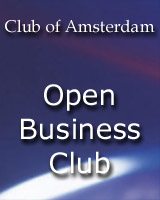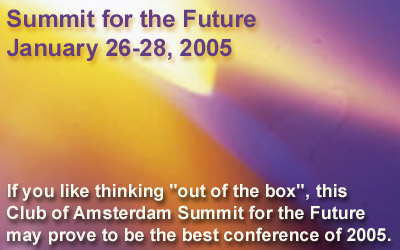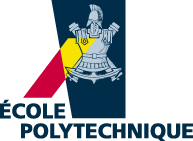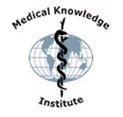
Club of Amsterdam Open Business Club

News about the Future

Summary Of The World: Googlezon And The Newsmasters EPICBy “Robin Good”
“By the year 2014, what I call newsmasters will be the most sought-after and highly rewarded professional media creators the world has ever seen.
Newsmasters are an emerging group of news editors which utilize new tools and techniques to create unique content streams on specialized topics by tapping largely into the RSS content universe as well as in other openly reusable sources of news and information.
In the fascinating scenario explored in this story, newsmasters will be the key news directors and producers of the future. They will be able to connect, filter and prioritize information for every media-consumer on the planet, using a single source of media content that contains everything that anyone could possibly ever want to know about.
That single source is called EPIC: The ‘Evolving Personalized Information Construct’.

A nation demands the right to exist
By Rupert Cornwell
The Inuit peoples of the Arctic have launched a dramatic legal action against America. The charge? That US emissions of greenhouse gases have made their very survival impossible.
Their ancient way of life is in unprecedented peril. Their very land is melting beneath their feet. Even the endless night of the Arctic winter, which should be one of nature’s most immutable constants, may be changing. It too appears to have fallen victim of the abrupt warming of the global climate which almost every one on earth – apart from the government of the United States – believes is exacerbated by the polluting industries of the modern world.

Summit Highlights
 Pascal Kerneis Managing Director, European Services Forum An energetic advocate of services liberalisation on behalf of European firms. Summit for the Future: Trade / Service Industry Representing the interests of the European services companies in the GATS Negotiations The European Services Forum is an organisation representing the services sector across the European Union. ESF represents more than 80% of the European exporters of services in more than twenty sectors. World trade in commercial services accounts for about 25% of world exports, but services account for 60% of annual flows of foreign direct investment (FDI). More importantly, the services sector provides more than 60% of jobs in developed countries, and the trend is growing in the developing countries. To unleash its potential for growth, the services sector requires market access and national treatment within a clear regulatory framework; hence, the absolute necessity of substantial new commitments in the current WTO services negotiations in the framework of the Doha Development Agenda. The European Services Forum strongly supports and encourages the movement to liberalise service markets throughout the world and to remove both trade and investment barriers. However, it has to be clear that liberalisation needs to be accompanied by a good regulatory infrastructure that encourages transparency, competition and fairness. Pascal Kerneis will focus on: | ||
| increasing market access for European services companies outside the EU 25,allowing speediest movement of high skills business personnel that have to be able to go quickly to their subsidiaries or clients around the world,increasing the possibility in moving data on a cross-border basis in a legally secure environment. | ||
| All these three aspects might be accomplished through multilateral, regional or bilateral trade agreements by getting commitments in mode 3, 4 and 1 of the GATS. |
 Katie Begg Principal Lecturer, Institute of Energy & Sustainable Development, De Montfort University Summit for the Future: Energy She was an official expert on JI (Joint Implementation) and the CDM (Clean Development Mechanism) under the UNFCCC (United Nations Framework Convention on Climate Change) from 2002-4 and has published widely in this area in peer reviewed journals, book chapters, and having co-edited 2 books (Flexibility in Climate Policy, 2001, Earthscan and The Business of Climate Change, 2004, Greenleaf). |
 Wim van de Donk Chairman of the Netherlands Scientific Council for Government Policy. Professor, Faculty of Law, Tilburg University As chair of the Netherlands Scientific Council for Government Policy, Wim van de Donk spends his time thinking ‘out of the box” and encouraging others to do likewise. Summit for the Future: Media & Entertainment A new Map & Compass Discussion about the future of Dutch media, both commercial and public, have lost their way. It has become focussed on issues affecting broadcasting, when the future will bring us many more platforms that traditional broadcasting. The Netherlands Scientific Council for Government Policy will publish a report on its recommendations for the future at the end of January 2005. Wim van de Donk believes some fundamental changes in approach are needed in order to revitalize creativity and investment in Dutch media. This is important for the position of companies operating both in The Netherlands and in the rest of Europe. |
 Thomas Schael Research Manager, Institute irso (Istituto di Ricerca e Intervento sui Sistemi Organizzativi) Management Consultant, Butera e Partners Industrial sociologist, organisational designer and change management consultant. Summit for the Future: Science & Technology The evolving workplace and the future of face-to-face Knowledge is inseparable from people and work is a form of social interaction. The place of work is only part location it is a venue and for work related communication and social interaction. What does this mean in the case of research and innovation? The laboratory of the future – is it a place or a shared state of mind? |
 Geoff Royston Head of Operational Research, Department of Health, England Summit for the Future: Healthcare Dr. Geoff Royston has been responsible for a number of “futures” exercises in the health field and is particularly concerned with ensuring they add maximum value to organisational and business decision making. |
Summit for the Future: Opening Event
| Attent the Opening Event of the Summit for the Future – meet with global thought leaders! |
 Date: Wednesday, January 26, 2005, 09:30-12:30 Location: HES Amsterdam School for Business, Amsterdam, The Netherlands |
Recommended Book
Visions: How Science Will Revolutionize the 21st Century
by Michio Kaku
Take it easy: that’s Michio Kaku’s motto. Given the extraordinary advances science has thrown up in time for the millennium, the only way you could possibly fit them into a single volume is by a correspondingly massive simplification.
Subtitled How Science Will Revolutionize the 21st Century and Beyond, Visions assumes that, by and large, scientists get to do whatever they like, that all technologies are consumer technologies, and that consumers welcome anything and everything science throws at them. Kaku gets away with this frankly dodgy strategy by dint of sheer hard work. He has based his predictions on interviews with more than 150 renowned working scientists; he integrates these interviews with a huge body of original journalistic material; and, above all, he roots that mass of information on an entirely reasonable model of what the purpose of science will be in the third millennium. Up until now, science has expended its efforts on decoding most of the fundamental natural processes – “the dance,” as Kaku puts it, of elementary particles deep inside stars and the rhythms of DNA molecules coiling and uncoiling within our bodies. Science’s task now, Kaku believes, is to cross-pollinate advances thrown up by the study of matter, biology, and mind – modern science’s three main theaters of endeavor. “We are now making the transition from amateur chess players to grand masters,” he writes, “from observers to choreographers of nature.” Then again, he also believes that “the Internet … will eventually become a ‘Magic Mirror’ that appears in fairy tales, able to speak with the wisdom of the human race.” Kaku, in short, deserves a good slapping – but he also deserves to be read. – Simon Ings
Digital music ‘niche’ market for foreseeable future, won’t replace CDs
Digital music ‘niche’ market for foreseeable future, won’t replace CDs
by Leigh Phillips
While digital music revenues will grow to be eight per cent of the total European music market by 2009, the CD will remain the bedrock of music sales, according to a new report by market analysts Jupiter Research.
By 2009, the researchers forecast that digital music revenues will grow to €836m, up from €10.6m at the end of 2003, representing eight per cent of the total music market, and will be a significant alternate distribution channel.
The report highlights a quadrupling in digital music revenues, from €10.6m in 2003 to €46.3m at the end of 2004, driven largely by new market entrants such as Apple’s iTunes Music Store and Napster, and by sales of digital music devices such as the iPod. However, despite the improved consumer choice these services bring, catalogue availability and prices remain inconsistent while incompatible audio formats add further confusion. The analysts also argue that the interoperability of audio formats and digital rights management would aid consumer adoption.
The new healthcare-ICT marketplace in England
| The new healthcare-ICT marketplace in England: an overview of some recent trends In its two years of existence, the National Programme for IT in the NHS in England has been radically changing the way in which NHS organisations procure their ICT systems. It has, undoubtedly, achieved discounts on a scale previously unknown in NHS procurements, but the resulting new marketplace, at present, is almost universally considered bewildering. Rightly or wrongly, its controllers are perceived as ruthlessly pursuing the introduction of a ‘one-system-for-all’ policy, at all levels, and thereby reducing the number of suppliers from the current some 2000 to possibly less than 100 in the next two to five years. […] John Higgins, Intellect’s Director General, said: “The UK healthcare-IT sector has changed dramatically, and will continue to evolve, leaving many SMEs with some difficult times ahead. Intellect wants to ensure that UK healthcare-IT SMEs are able to make informed strategic business decisions about entering new markets and have all the support they need.” |
 |
How research and innovation differ
How research and innovation differ
By Franco Malerba, TEARI PROJECT
Innovation in services
What about innovation in services? […] Similarly to high tech, or LMT sectors, services encompass a wide variety of sectors. As a consequence, a first step is grouping them in a taxonomy based on physical services (transport), human services (welfare state services- pensions, waste disposal services…) and information services (consultancies). In all three groups, adoption of information technology is very important. In addition, similarly to what experienced for LMT, a reverse product cycle may take place in that changes in existing processes (due to IT) lead later on to changes in service products (Barras,1986). However this has to be qualified because many innovations are non-IT based.In any case several service sectors have inertia and are slow in becoming highly innovative-a heritage form the past, because then firms did not pay that much attention to innovation strategies, nor had links with universities, government laboratories and so on. There are some exceptions: rail, broadcasting and telecommunication services (closely related to manufacturing). Also financial and retailing services (such as supermarkets) and business services (such as consultancies and training services) have been rather innovative.
In general, from surveys one finds that service firms tend to stress human resources and acquisitions rather than formal R&D. When formal R&D is undertaken it tends to be done on a project basis rather than being organized through R&D laboratories. Technological innovation is not important but organizational innovation is. The sources of innovation are both within the firms and from interaction with customers.
Innovation in supporting services such as knowledge intensive business services (KIBS) is becoming more and more relevant. KIBS are problem solvers and are very active in the innovative activities of their client firms and sectors: as coproducers of innovation (with the client), as orchestrators of innovation (contract R&D services), as orchestrator of innovation networks (developing long lasting collaboration between different firms) and as brokers to facilitate distributed innovation processes (mechanical test for companies). KIBS are different from research and transfer organizations which also supply services: they are more academic, have more applied research oriented projects and have a more public good type of functions – standards, metrics, awareness programs.
Club of Amsterdam Upcoming Events
| Special Events | |
.January 26-28, 2005 | Summit for the Future 2005 |
 | |
| Club of Amsterdam Season 2004/2005 | |
October 27, 2004 | the future of ICT |
| November 30, 2004 | the future of Developing Countries |
| February 23, 2005 | the future of the Service Industry |
| March 30, 2005 | the future of Water |
| April 27, 2005 | the future of Branding |
| June 1, 2005 | the future of Robotics |
| June 29, 2005 | the future of Philosophy |
| . |














Customer Reviews
Thanks for submitting your comment!